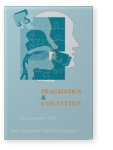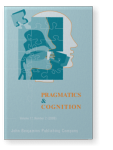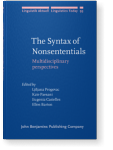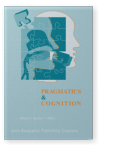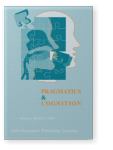Robert J. Stainton
List of John Benjamins publications for which Robert J. Stainton plays a role.
2013 Revisiting pragmatic abilities in autism spectrum disorders: A follow-up study with controls Pragmatics & Cognition 21:2, pp. 253–269 | Article
In a 2007 paper, we argued that speakers with Autism Spectrum Disorders (ASDs) exhibit pragmatic abilities which are surprising given the usual understanding of communication in that group. That is, it is commonly reported that people diagnosed with an ASD have trouble with metaphor, irony,… read more
2009 Perry, Wittgenstein’s builders, and metasemantics Pragmatics & Cognition 17:2, pp. 203–221 | Article
The paper discusses in detail John Perry’s important article “Davidson’s Sentences and Wittgenstein’s Builders”. Perry argues, on the basis of Wittgenstein’s famous block/slab language, that words make direct metasemantic contact with the world. The present paper urges that, while Perry’s… read more
2006 4. Neither fragments nor ellipsis The Syntax of Nonsententials: Multidisciplinary perspectives, Progovac, Ljiljana, Kate Paesani, Eugenia Casielles-Suárez and Ellen Barton (eds.), pp. 93–116 | Chapter
1997 Utterance meaning and syntactic ellipsis Pragmatics & Cognition 5:1, pp. 51–78 | Article
Speakers often use ordinary words and phrases, unembedded in any sentence, to perform speech acts—or so it appears. In some cases appearances are deceptive: The seemingly lexical/phrasal utterance may really be an utterance of a syntactically eplliptical sentence. I argue however that, at least… read more
1994 Using non-sentences: An application of Relevance Theory Pragmatics & Cognition 2:2, pp. 269–284 | Article
Michael Dummett has nicely expressed a rather widespread doctrine about the primacy of sentences. He writes: "you cannot DO anything with a word — cannot effect any conventional (linguistic) act by uttering it — save by uttering some sentence containing that word ...". In this paper we argue that… read more
